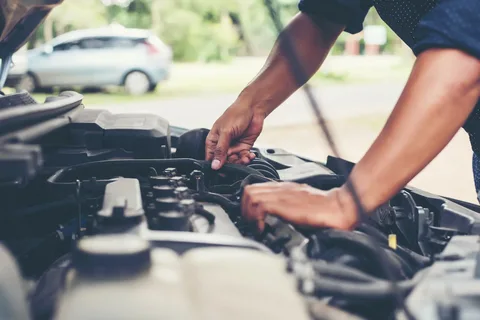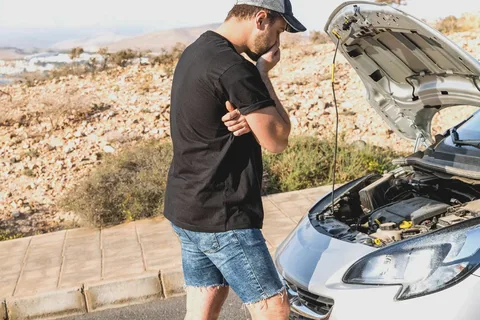If your engine is knocking at startup, there are a few possible causes. First, it could be due to using lower-octane fuel than what’s recommended for your car. Second, your engine could be dirty and in need of a good cleaning. Third, you might have a loose spark plug or two. Whatever the cause, we hope this blog will help you diagnose and fix the problem!
Causes of Engine Knocking at Startup
Contents
There are many potential causes of engine knocking at startup, including:
- Incorrect fuel octane rating: If the fuel you’re using has a lower octane rating than what is recommended for your vehicle, it can cause engine knocking.
- Dirty spark plugs: Dirty or fouled spark plugs can cause engine knocking.
- Carbon deposits on valves: Carbon deposits on the intake or exhaust valves can cause engine knocking.
- Worn piston rings: Worn piston rings can cause engine knocking.
- Worn or damaged bearings: Worn or damaged bearings can also cause engine knocking.
How to Fix Engine Knocking at Startup
If you have an engine knocking at startup, there are a few things you can do to fix it. First, check your oil level and add oil if necessary. Second, check your spark plugs and replace them if they are worn out. Finally, have your engine checked by a qualified mechanic to make sure there are no other issues.

How to Prevent Engine Knocking at Startup
One way to prevent engine knocking at startup is to use higher-quality gasoline. Another way to prevent engine knocking at startup is to make sure your engine is properly tuned.
The Consequences of Engine Knocking at Startup
If your engine is knocking at startup, it could be a sign of serious engine damage. Engine knocking can cause piston damage, cylinder wall damage, and Bearing damage. If left unchecked, engine knocking can lead to engine failure.
How Engine Knocking at Startup Affects Your Car
Engine knocking at startup can have several causes, but the most common is improper ignition timing. If the spark plugs are firing too early, it can cause the air/fuel mixture to detonate prematurely and cause a knocking sound. Other causes can include a dirty or faulty spark plug, a weak ignition coil, or a clogged fuel injector.

If you hear an engine knocking at startup, it’s important to have it checked out by a mechanic as soon as possible. Left unchecked, it can cause serious damage to your engine.
How Engine Knocking at Startup Affects Your Driving
If your car is making a knocking noise at startup, it could be due to a variety of issues. This could be something as simple as an engine that is low on oil, or it could be a more serious issue such as a problem with the pistons. Either way, it’s important to have this checked out by a mechanic as soon as possible. Engine knocking can cause damage to your car over time, and it may affect your driving performance.
How Engine Knocking at Startup Affects Your Engine
engine knocking is defined as a banging, rattling or knocking noise that is produced when the air-fuel mixture in the cylinders is detonating more than once place at a time. This can cause serious damage to your engine over time, as well as decreased performance and fuel efficiency.
Detonation can occur when the air-fuel mixture in the cylinders is too lean, or too rich, or if there is an excessive build-up of carbon deposits on the piston heads or valves. It can also be caused by a loss of compression due to a damaged head gasket or cylinder.
Knocking can occur at startup if the engine has not been properly warmed up first. This can cause the air-fuel mixture to detonate prematurely, which can damage the pistons and valves. It is important to let your engine warm up for at least 30 seconds before driving off to prevent this from happening.
How Engine Knocking at Startup Affects Your Car’s Value
If you’re selling your car, you may be worried about how engine knocking at startup will affect its value. Engine knocking is a common problem that can significantly reduce the value of your car. Here’s what you need to know about engine knocking and how it can affect your car’s value.
Engine knocking is caused by a build-up of unburned fuel in the cylinders. When the engine is started, the unburned fuel ignites and causes a knocking sound. Engine knocking can damage the engine and reduce its efficiency.
While engine knocking isn’t necessarily a serious problem, it can be expensive to fix. If you’re selling your car, potential buyers may be concerned about the cost of repairing engine knocking. As a result, you may want to adjust your asking price accordingly.
If you’re not selling your car, you may still want to get the engine knocking repaired. While it’s not a critical problem, it can lead to reduced fuel efficiency and increased emissions. If you’re concerned about the environmental impact of your car, getting the engine knocking fixed is a good way to reduce your emissions.
FAQs(Frequently Asked Questions)
How Do I Stop Engine Knocking on Startup?
- The first step in trying to fix engine knocking is to upgrade to gasoline with a higher octane rating. …
- Give your engine a tune-up that includes new spark plugs and wires.
- Regularly change the oil in your vehicle and monitor for a low oil level.
Why is My Engine Knocking on a Cold Start?
Can a Knocking Engine Be Saved?
Is Engine Knock Serious?
Why Does My Car Tick When I First Start It?
How Expensive is It to Fix an Engine Knock?
Do I Need a New Engine if It’s Knocking?
Can an Oil Change Fix an Engine Knock?
What Happens if You Don’t Fix Engine Knock?
Conclusion
Common worn engine components that cause engine knocking noise during startup are water pumps, power steering pumps, exhaust manifolds, and alternators. These noises are considered normal working conditions, and your car will perform appropriately once a specific part fails
